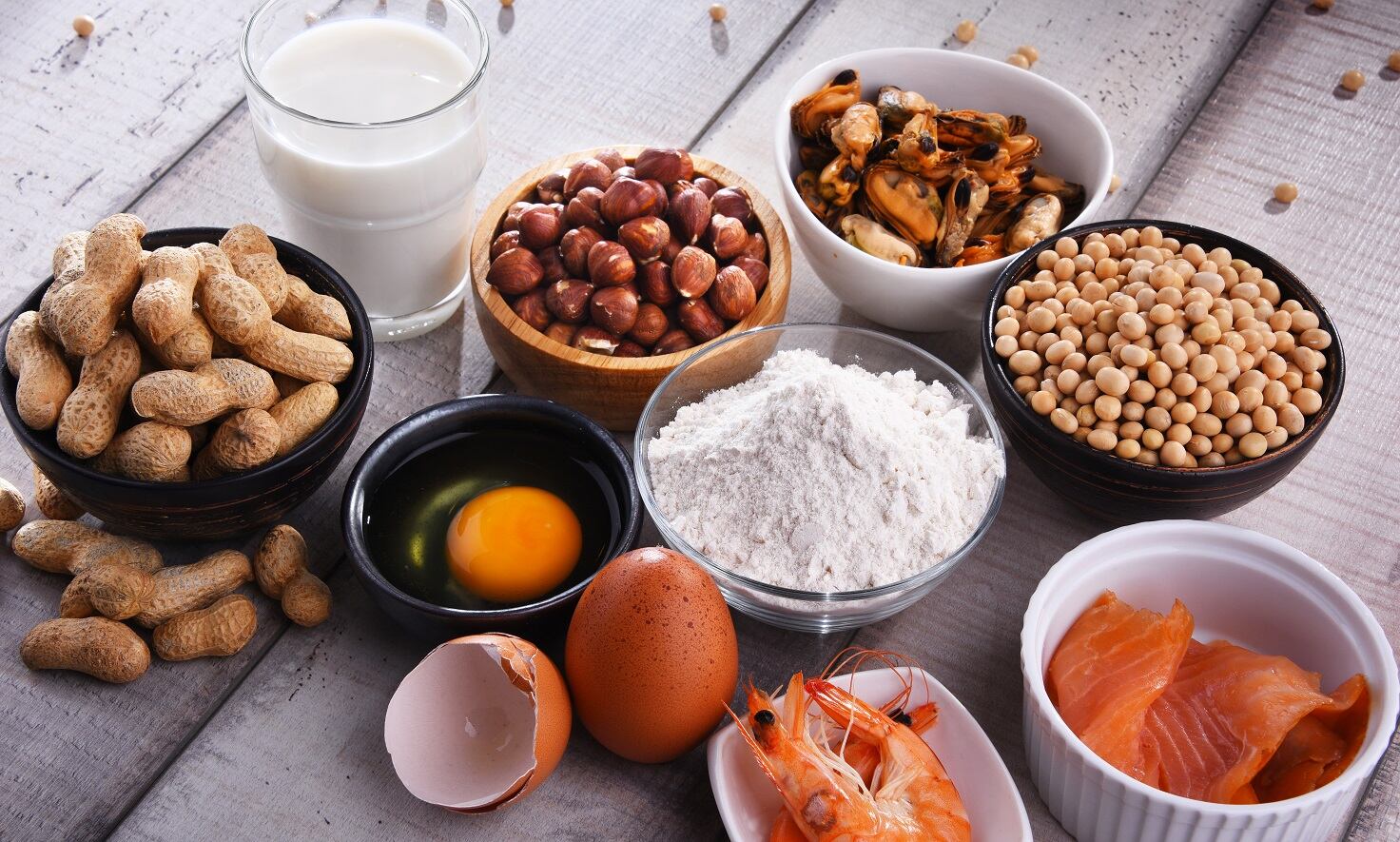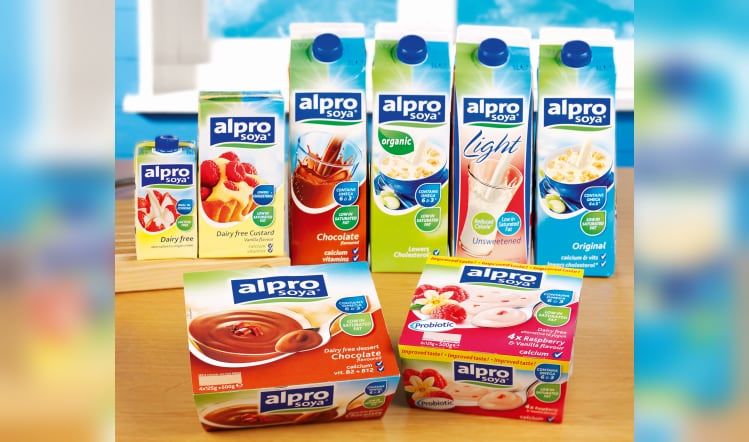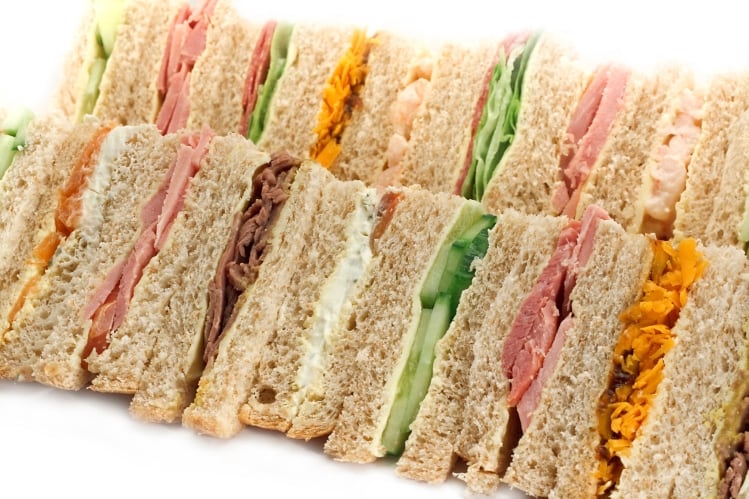Everything from gluten-free to dairy-free and nut-free products have been launched, ranging from breads and plant-based 'milks' to cakes and confectionery.
While much innovation is coming from small entrepreneurial food manufacturers, big food companies are also recognising the demand. Warburtons has entered the free-from cake market, Nestlé sells gluten-free cereals, while Mars offers dairy-free options of its drinks to vegan versions of its Topic and Bounty Bars.
The recent change in legislation around allergens with Natasha’s law, which was introduced to protect allergy sufferers, has put free-from back into the spotlight. This UK Food Information Amendment came into force on 1 October 2021 requiring food businesses to provide full ingredient lists and allergen labelling on foods prepackaged for direct sale on the premises.
Unprepared for regulations
Early indications were that food manufacturers were unprepared for the new regulations as they came into force as research from GS1 UK found that four in ten businesses had never heard of the law, while eight in ten said they were unprepared for the new food regulations.
However, the Food Standards Agency (FSA) says its own survey of 2,300 businesses in March 2020 found that four in every five food businesses selling foods covered by the new law (78%) labelled all allergenic ingredients, and three in every five labelled all ingredients.
The FSA confirms it will be undertaking a post implementation review of the allergen law change and will continue to provide businesses with support in the coming months.
Precautionary allergen labelling
It has also promised to look into the issue of precautionary allergy labelling, which has been accused of being confusing for both manufacturers and consumers, with a public consultation planned for later in the year.
While there is increasing legislation around allergens and labelling this does not seem to have impacted the growth in the free-from sector.
According to the Mintel UK Free-From Foods Market Report 2021 following a slowdown in 2019, sales growth in the free-from foods market accelerated again in 2020, with value sales rising by 16.9% year on year to break through the £1bn ceiling.
Sales grew
The report says the closing of the foodservice industry with the COVID-19 pandemic, and the stock shortages from panic-buying, forced people into changing their spending habits and buying alternatives to their usual meals. Sales in the specific free-from market grew to £652m in 2020, with dairy-free and lactose-free sales reaching £455m.
There has also been an overall shift towards eco-friendly and dairy-free food, with the media’s focus on global warming and documentaries such as David Attenborough’s A Life On Our Planet advocating for more sustainable eating habits, Mintel adds.
“In the longer term, the pandemic’s acceleration of sustainability and health trends will support the market’s continued growth," says Emma Clifford, associate director, Mintel Food and Drink Research.
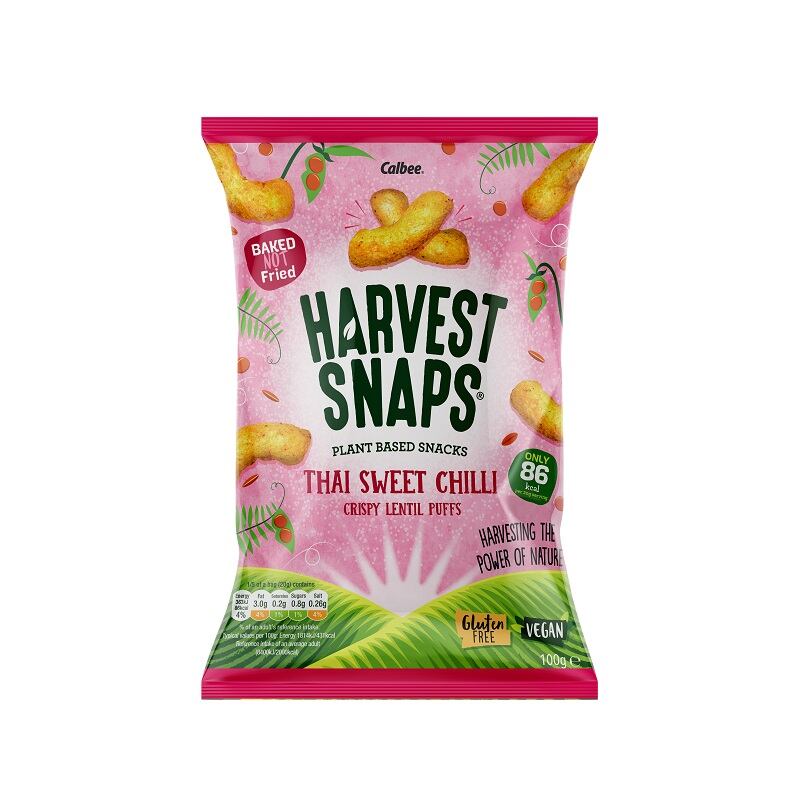
Health
One example of the health trend is the August 2021 launch by Calbee UK of plant-based, gluten-free snacks under its Harvest Snaps brand. The products fall below the proposed Government high fat salt and sugar (HFSS) restrictions, meaning they can still be merchandised in promotional display spaces after the new legislation comes into force in 2022.
“The exciting new range for the UK is based on extensive research into the ‘better for you’ shopper’s needs," says Calbee UK commercial director Jon Wood. "The vegetable and pulse-based snacks provide a healthy alternative to traditional fried crisps and snacks, being baked not fried, with under 100 calories per portion.
"Available in two flavours, Sour Cream & Chive Lentil Rings and Thai Sweet Chilli Lentil Puffs, Harvest Snaps meets consumer demand with a variety of pack formats including portion controlled six packs, single handy packs and sharing bags. The entire range is vegan and gluten-free with all green and amber GDAs [Guideline Daily Amounts]."
Wood says few snacks will not fall foul of the HFSS ban next year, so those that are eligible to sit in promotional areas are set to do well.
'Better for you'
Bryan Martins, marketing and category director, Ecotone UK, the company behind the Mrs Crimbles and Kallo brands, says: "In light of the pandemic, there has been more awareness about the benefits of maintaining good health and many perceive free-from to generally be better for you. This is causing a rise of free-from lifestyle snackers to join the category – these are people choosing free-from as a healthier option rather than a medical need."
Cressida Langlands, chief executive of the Free From Food Awards, agrees health has become an increasing trend in the wake of the pandemic. She says the introduction of Natasha’s Law has brought more focus to the issue of allergens.
She reveals that despite the impact of the pandemic there has been a boost, with more innovative, premium and fun products from food manufacturers coming into the mix.
Quality is also improving and it is now often hard to tell the difference between a product free from an ingredient consumers are sensitive or allergic to and one that is not, claims Langland. “Free from is no longer the poor cousin of the food sector.”
Dairy
One area she is seeing an improvement in is faux dairy and particularly cheese, which she calls ‘really exciting’.
She highlights recent developments including a Camembert made of cashew nuts and a cheese with real mould that is just like a real Gorgonzola.
“For those that don’t eat dairy, good cheese is difficult to get hold of,” she says. “I am hoping that they will continue to increase in number.”
In the wider dairy-free space, Nush, the producer of dairy-free and soya-free, live almond m*lk Yogs and Spreadable Ch*ese announced on 1 November it had expanded the reach of both ranges. It launched Natural Spreadable Ch*ese in Waitrose outlets for the first time and the product is now available in 240 stores nationwide. It also extended distribution of its Strawberry Yog to 263 Sainsbury’s stores.
Does allergen list fit UK?
Shoppers searching for products made without the 14 main allergens, such as milk, fish, mustard and peanuts, may be driving innovation, but Langland questions whether the line-up still fits the UK. The list, which was compiled across Europe, includes celery and oats, which she says are not major allergens for UK residents, but leaves out peas and chickpeas, which she claims are more ‘prevalent’.
It is well documented that there’s a growing need for more free-from products to meet demand – despite there being no evidence as to why. However, one challenge for food manufacturers is how to cater for those who have more than one allergy.
“Allergies are continuing to increase,” Langlands adds. “Multiple allergy-free products are going to be more in demand.”
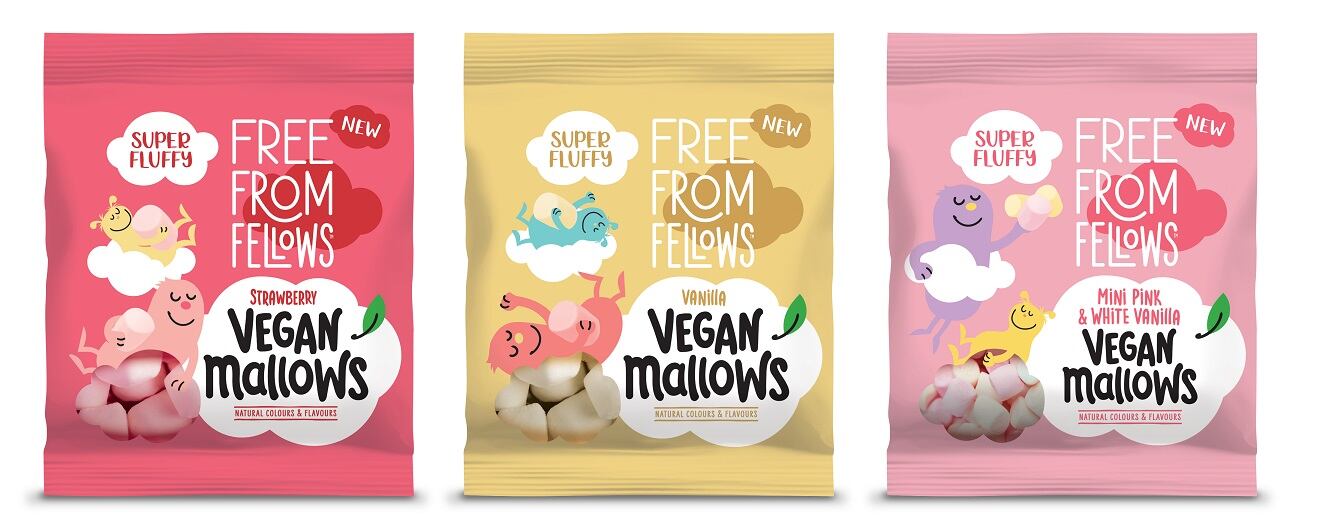
Free-from multiple allergens
This view is supported by Lisa Gawthorne, managing director of Bravura Foods, who brought sugar-free sweets and vegan marshmallow brand Free From Fellows – sold by Ocado and Boots among others – to market. They launched into Sainsbury's stores on 17 October.
“It can be frustrating for consumers shopping the free-from category who may pick up products that are gluten-free but contain milk, or they pick up a product that’s egg free but contains soy and milk,” she says. “Many consumers, particularly the ‘lifestylers’ like to avoid more than one allergen.”
It’s not just the ‘lifestylers’. In August, baby & toddler meal provider Mamamade began rolling out its convenient toddler range of meals, which are free-from the 'top eight allergens', including milk, soya and peanuts, via rapid, on-demand grocery delivery service Gorillas.
The partnership aims to make healthy and nutritious meals for toddlers more accessible and available to busy parents by delivering the brand's flash frozen meals direct to consumers' doors in under ten minutes. Mamamade's meals are fully plant-based, made using 100% organic ingredients, and free from the ‘Top 8 Allergens’, including milk, soya and peanuts. They include Lentil Shepherd’s Pie; Kale Pesto Pasta; Lentil Veggie Bites; and Banana Oat Pancakes.
Equally, the popularity of free-from products is also being driven by adults with multiple allergies and those with other health issues, says Gawthorn. “Having an allergy can be life threatening, having an intolerance whilst unpleasant, doesn’t carry the same life-threatening issues.
'Lifestyle option'
“Many people self-diagnose their intolerances or just prefer to shop for free-from products as a lifestyle option as opposed to strict dietary requirements.”
Ecotone UK's Martin says: "Free-from shoppers are now looking for products in the fixture that exclude more than one major ingredient. Our gluten-free bakery brand, Mrs Crimble’s, has always had strong appeal with coeliac sufferers or those looking to cut out gluten to improve digestion. Now the brand has broadened its appeal to extend to shoppers that want to remove or reduce animal products from their diet as well as gluten."
As an example, Mrs Crimble’s Soft Oaty Bakes with Chocolate - launched in May 2021 - are suitable for vegans, portion-controlled, a good source of fibre and offer just 155 calories per bake. As with Harvest Snaps, they demonstrate a certain overlap between vegan, free-from and healthy eating trends, the common link in many cases being health concerns.
Natasha's Law raises awareness
Natasha’s Law has made manufacturers more aware of the needs of consumers suffering from allergies when it comes to FMCG packaging and designing information on products that’s easy for consumers to check, Gawthorne claims.
While labelling is important to educate and protect the consumer, keeping products allergen-free on the production line is a challenge, whether that is with ingredients or cross contamination.
Gawthorne says it’s important for staff to be fully aware of the implications of bringing any food on site that may contain allergens.
Regular training
The whole Free From Fellows workforce is required to attend regular training from the FSA, which includes modules about avoiding cross-contamination in an allergen-free environment.
“Training is the biggest tool an allergen-free manufacturer has,” she adds. “It’s essential to ensure staff are kept up to date with best practices.”
It’s not just the production line and food that can be a source of contamination.
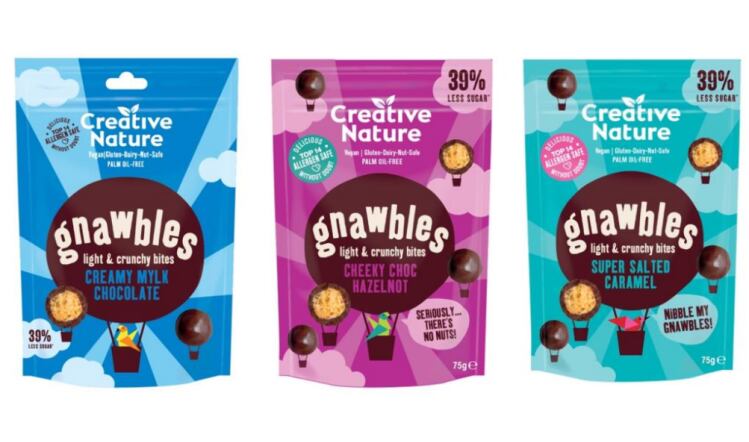
Packaging
Julianne Ponan, founder of free-from snack brand Creative Nature, which launched allergen-free, plant-based confectionery bags under its Gnawbles brand in wholesaler Hancocks in January 2021, says packaging can be a pinch point.
“Packaging needs to be resistant so that allergens are kept out,” Ponan says. “We are starting to move more towards recyclable packaging and this area needs to be taken into consideration too.”
Allergen labelling is an area that can remain confusing for the consumer and she argues that food manufacturers still have some work to do.
“They’re just putting allergen flags on labels, instead saying ‘may contain’ on many allergens, which is very confusing to a consumer.”
Dawn Foods and labelling
Bakery ingredients and products manufacturer Dawn Foods says it’s tackling the issue of labelling by making products in a gluten-free environment, with each product individually wrapped in printed film with full nutritional information.
“On-pack nutritional information makes it easier for our customers to keep gluten-free bakery items separate from their regular products and, in turn, gives confidence to the consumer about the ingredients in the product they are buying,” says Dawn Foods marketing manager, UK and Ireland Jacqui Passmore.
As demand for free-from products escalates, ingredients suppliers are always in search of the best alternative ingredients. These could be flavour alternatives that simulate the taste of nuts or the taste and mouthfeel of eggs, milk, or gluten.
Technology
“As new technology develops, new substitutes and flavour enhancers are becoming more readily available, with naturally produced ingredients being on-trend, rather than synthetic ones,” says Passmore.
This is a view supported by Robert Lambert, head of marketing at free-from ingredients specialist Ulrick & Short, who claims free-from ingredient technology has come a long way in the past 24 months.
“There are now a broad range of ingredient technologies that exist to replace allergens – although these differ considerably depending on the allergen and the application,” Lambert says. “The trick for manufacturers is to reformulate/develop free-from products in a clean and transparent way – without the use of chemically modified products.”
The future
How will the free-from market evolve in the next few years? Lambert predicts it will deliver new eating experiences. “In the longer term, as the buying power of younger generations increases, the free-from sector will continue to thrive.”
The challenge for food manufacturers will be how to respond to shifting demand.
Natasha’s Law has focused the minds of consumers and the food industry on allergens and the food labelling.
Increasing numbers of consumers needing and demanding more information and allergen-free products could pose continued challenges for labelling and innovation in the free from sector.

